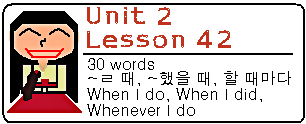 Lesson 42: In this lesson, you will learn how to say “When I…” by adding ~ㄹ 때 to words. By using this form, you can make sentences like “When I go to Korea, I will study Korean.” You will also learn how to use this form in the past tense and also how to say “Whenever I…” Lesson 42: In this lesson, you will learn how to say “When I…” by adding ~ㄹ 때 to words. By using this form, you can make sentences like “When I go to Korea, I will study Korean.” You will also learn how to use this form in the past tense and also how to say “Whenever I…”
This Lesson is also available in Español, Русский, Deutsch and العربية |
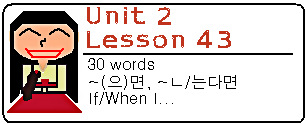 Lesson 43: In this lesson, you will learn how to say “if” and “when” by using ~(으)면 or ~ㄴ/는다면. Lesson 43: In this lesson, you will learn how to say “if” and “when” by using ~(으)면 or ~ㄴ/는다면.
This Lesson is also available in Español, Русский, Deutsch and العربية |
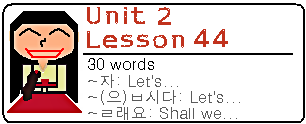 Lesson 44: In this lesson, you will learn about ~자 and ~ㅂ/읍시다, which are two common endings that you can use to suggest that you do something with another person. In addition, you will learn how to use ~ㄹ래(요) which can sometimes be used in similar situations. Lesson 44: In this lesson, you will learn about ~자 and ~ㅂ/읍시다, which are two common endings that you can use to suggest that you do something with another person. In addition, you will learn how to use ~ㄹ래(요) which can sometimes be used in similar situations.
This Lesson is also available in Español, Deutsch and العربية |
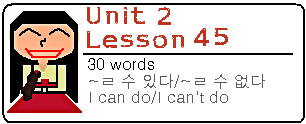 Lesson 45: In this lesson, you will learn how to add ~ㄹ 수 있다 and ~ㄹ 수 없다 to the ends of words to create the meaning of “I can” and “I can’t.” Lesson 45: In this lesson, you will learn how to add ~ㄹ 수 있다 and ~ㄹ 수 없다 to the ends of words to create the meaning of “I can” and “I can’t.”
This Lesson is also available in Español, Deutsch and العربية |
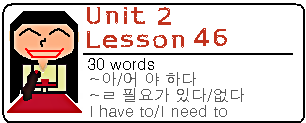 Lesson 46: In this lesson, you will learn how to say “I have to” and “I need to” using two grammatical principles. By using ~아/어야 하다, you can create the meaning of “I have to” and by using ~ㄹ 필요가 있다 to say “I need to.” Lesson 46: In this lesson, you will learn how to say “I have to” and “I need to” using two grammatical principles. By using ~아/어야 하다, you can create the meaning of “I have to” and by using ~ㄹ 필요가 있다 to say “I need to.”
This Lesson is also available in Español, Deutsch and العربية |
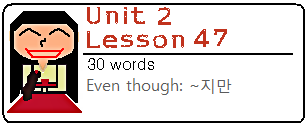 Lesson 47: In this lesson, you will learn how to use ~지만 to connect two clauses. You will also learn about adding this to 그렇다 to make 그렇지만. Lesson 47: In this lesson, you will learn how to use ~지만 to connect two clauses. You will also learn about adding this to 그렇다 to make 그렇지만.
This Lesson is also available in Español, Deutsch and العربية |
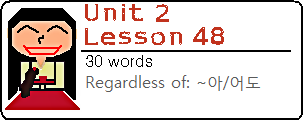 Lesson 48: In this lesson, you will learn how to use ~아/어도 to connect two clauses. You will also learn about adding this to 그렇다 to make그래도 and about the word 아무리. Lesson 48: In this lesson, you will learn how to use ~아/어도 to connect two clauses. You will also learn about adding this to 그렇다 to make그래도 and about the word 아무리.
|
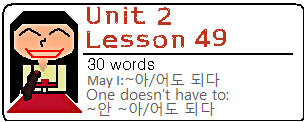 Lesson 49: In this lesson, you will build on your understanding of ~아/어도 to make sentences using 되다. Using these concepts, you will be able to indicate that here is no problem if something is or is not done. Lesson 49: In this lesson, you will build on your understanding of ~아/어도 to make sentences using 되다. Using these concepts, you will be able to indicate that here is no problem if something is or is not done.
|
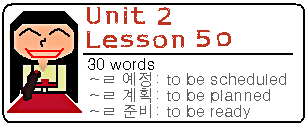 Lesson 50: In this lesson, you will learn how to add three nouns (예정, 계획 and 준비) after the future-tense construction of ~는 것 – ~ㄹ/을 것. By using these three nouns after this grammatical formation, you will be able to say a wide variety of common sentences. Lesson 50: In this lesson, you will learn how to add three nouns (예정, 계획 and 준비) after the future-tense construction of ~는 것 – ~ㄹ/을 것. By using these three nouns after this grammatical formation, you will be able to say a wide variety of common sentences.
|
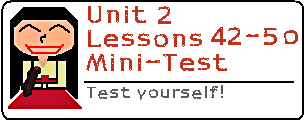 Lessons 42 – 50 Mini Test: Test yourself on what you learned from Lessons 42 to 50! A Mini-Test like this will be uploaded after every eight lessons. Don’t worry if the test doesn’t go so well – this website is here to help you! Lessons 42 – 50 Mini Test: Test yourself on what you learned from Lessons 42 to 50! A Mini-Test like this will be uploaded after every eight lessons. Don’t worry if the test doesn’t go so well – this website is here to help you!
|

